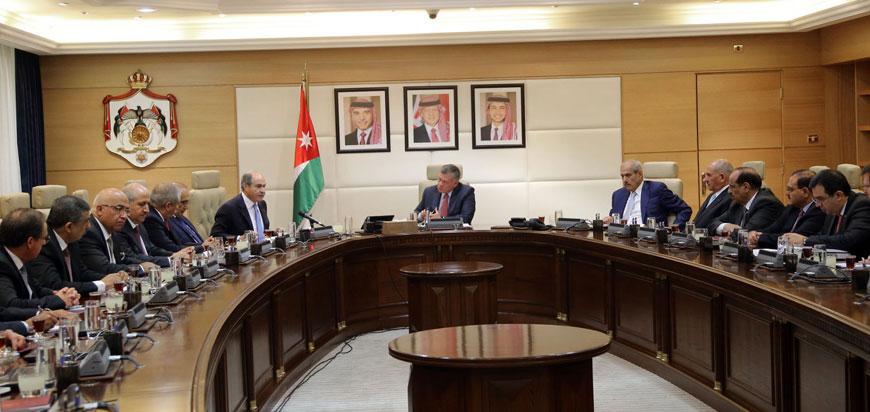You are here
Public awareness key to elections success — King
By JT - Jul 28,2016 - Last updated at Jul 28,2016

His Majesty King Abdullah chairs a Cabinet meeting in Amman on Thursday (Photo courtesy of Royal Court)
AMMAN – His Majesty King Abdullah on Thursday stressed the importance of the upcoming parliamentary elections in boosting the national reform process.
He voiced hope that the September 20 polls would result in a Lower House that exercises effectively its legislative and oversight role, on behalf of all segments of the society and meets the expectations of Jordanians, a Royal Court statement said.
During a visit to the Prime Ministry where he chaired a Cabinet meeting, King Abdullah urged the government to continue its support to the efforts of the Independent Election Commission (IEC) in raising the awareness of voters on the Election Law and the voting mechanism, particularly in governorates, calling for close coordination with all concerned parties to render the elections a success.
In regards to the economic situation, His Majesty stressed the importance of continuing work to lure investments to achieve higher economic growth rates that would reflect positively on the people.
He highlighted the London donor conference held in February and the need to ensure that people in governorates feel the positive impact of its outcome and economic support to the Kingdom.
The King thanked the government for its intensive efforts over the past two months and measures itv took to boost investments and enhance the business environment. He also commended the government’s support for the IEC.
The Monarch directed the Council of Ministers to continue dialogue with the people, underlining the importance of stepping up field visits by ministers to have a first-hand look at the challenges facing Jordanians.
The King also stressed the importance of constant follow-up on the National Strategy to Combat Extremism at all levels to prevent the influence of ideologies alien to the Jordanian culture on the youth.
He stressed the importance of preserving the achievements of the Kingdom by a policy of zero tolerance for disrespect to the rule of law.
During the meeting, Prime Minister Hani Mulki went over the government plans and programmes started implementing since its inception.
Mulki said that the government has devised a detailed action plan based on the requirements of the current stage and the Royal directives entailed in the Letter of Designation.
He emphasised that it has become possible to talk about achievements made by the new government, after two months since it took oath of office, stressing that the government’s approach focuses on fieldwork in order to stand at the needs of the public.
In the field of economic reform, the premier said that the government has wrapped up the agreement with the International Monetary Fund and took several measures to stimulate the Amman Stock Exchange, in addition to forming committees under the newly established Economic Policies Council.
The government also started a reform plan for the transportation system as traffic jams have become a major headache, apart from their adverse effect on the environment, Mulki said.
In the fight against poverty and unemployment, an issue of top priority in the Letter of Designation, Mulki said that a strategic employment plan is in place and that a ministerial committee headed by the premier has been set up to oversee its implementation.
The prime minister also highlighted developing businesses at the Jordan Valley, noting that a specialised company to manage Wadi Araba was established, underlining the expected contribution of the private sector to the success of the plan.
As for future plans, Mulki said the government is about to make a development plan to boost medical tourism and its resources.
He said that after announcing the results of the General Secondary Education Certificate Examination (Tawjihi), a need emerged to further promote the private universities regionally.
As for the London donor conference, the premier said that the Ministry of Planning and International Cooperation, as part of its mandate to follow up on the meeting’s recommendations and outcomes, has reached a deal with the EU to ease the rules of origin, signed on July 19.
Individual ministers took turns to elaborate on the plans, based on the 19 aspects included in the Letter of Designation.
Deputy Prime Minister for Economic Affairs Jawad Anani highlighted progress in the economic reform, with focus on the Jordan Investment Fund. He said the government has been in contact with the Saudi side to activate the fund, which was created mainly to attract Saudi investments.
Deputy Prime Minister for Services and Minister of Education Mohammad Thneibat outlined plans to boost vocational education through the newly established applied education stream in high schools.
Interior Minister Salameh Hammad said all legislative requirements to implement the decentralisation plan would be in place before the end of September.
Related Articles
AMMAN — As prime minister-designate Hani Mulki continued on Monday consultations to form his government, which will prepare the stage for th
AMMAN — Prime Minister Hani Mulki on Friday stressed the twin local elections held on Tuesday represent a milestone in the comprehensive ref
AMMAN — Senate President Faisal Fayez and members of the Upper House on Tuesday held a consultation meeting with Prime Minister Hani Mulki a

















